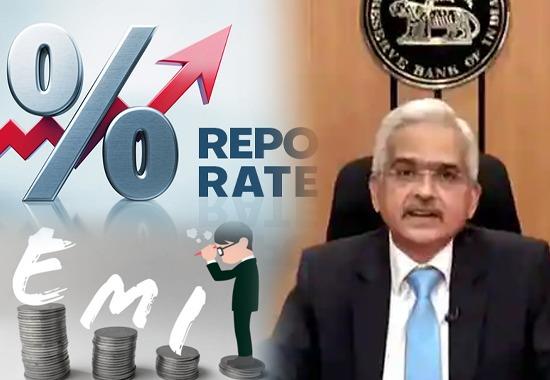The Reserve Bank of India (RBI) raised the repo rate by 0.35% due to mounting inflation concerns. As a result, the repo rate went from 5.90% to 6.25%. This implies that you will have to pay higher EMIs on all loans, including personal, auto, and home loans.
The Monetary Policy Committee began meeting on December 5 to discuss setting interest rates. In a news conference on Wednesday, RBI Governor Shaktikanta Das delivered an announcement regarding interest rates. Interest rates were raised earlier in the September meeting from 5.40% to 5.90%.
Every two months, a monetary policy meeting is held. In April, the first meeting of this fiscal year was held. The repo rate was then maintained by RBI at 4%. However, by convening an emergency meeting on May 2 and 3, the RBI raised the repo rate by 0.40% to 4.40%.
This repo rate adjustment occurred after May 22, 2020. Following that, the repo rate was raised by 0.50% during the June 6-8 meeting. As a result, the repo rate went up to 4.90% from 4.40%. Then it was raised by 0.50% in August, bringing it to 5.40%. In September, interest rates increased to 5.90%. The current interest rate is 6.25%.
How much of a difference will a 0.35 percent rate rise make?
Let's say Aman takes out a 30-lakh loan with a fixed rate of 7.5% over a 20-year period. He pays Rs 24,260 in EMI. At this rate, he will be required to pay Rs. 28,22,304 in interest after 20 years. Thus, rather than paying Rs. 30 lakh, he will now be required to pay Rs. 58,22,304 in total.
After Aman took out a loan, the RBI increased the repo rate by 0.35 percent. Banks have consequently raised interest rates by 0.35 percent. Now, when Aman's friend went to the same bank to apply for a loan, the bank informed him the interest rate was 7.90% rather than 7.55%.
Another acquaintance of Aman borrows Rs. 30 lakh for 20 years, however, his EMI is only Rs. 24,907. That implies that Aman's EMI is Rs 647 higher. As a result, Aman's friend will have to pay Rs 59,77,634 in total over the course of 20 years. It will be assessed an additional Rs 1,55,330 above Aman.
Will the EMI on an existing loan also rise?
Loan interest rates come in two varieties: fixed and floating. Your loan's interest rate remains constant during a fixed loan. Changes in the repo rate are irrelevant here. The interest rate on your loan is also impacted by changes in the repo rate in the floater. If you have a loan with a floating interest rate in this situation, your EMI would also go up.
